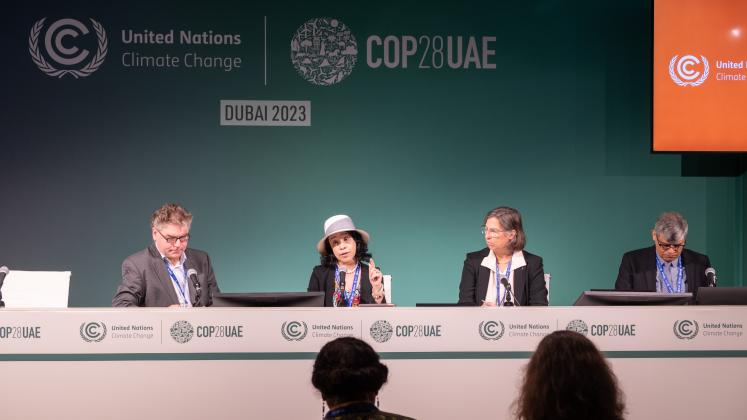An official side event of the 2023 UN Climate Change Conference (UNFCCC COP28) discussed how to leverage science and emerging technologies to build resilience to climate change and support a just transition. The event was held on 9 December by UNESCO, UNU-IAS and the Intergovernmental Panel on Climate Change (IPCC).
Opening remarks by Lidia Brito (Assistant Director-General a.i. for Natural Sciences, UNESCO) outlined how UNESCO work in natural sciences was addressing the interconnected challenges of climate change. She underlined the importance of open and citizen science, drawing attention to the opportunity presented by the International Decade of Sciences for Sustainable Development (2024–2023). Gabriela Ramos (Assistant Director-General for Social and Human Sciences, UNESCO) called for efforts to tackle asymmetries in knowledge, power, and decision-making, highlighting key points from the UNESCO Recommendation on Open Science that was adopted in 2021.
Abdalah Mokssit (IPCC Secretary) outlined the implications of different emissions scenarios, calling for urgent action to reduce greenhouse gas emissions. He noted that climate science was providing a better understanding of how effective and equitable climate action was possible.
UNU-IAS Director Shinobu Yume Yamaguchi presented as part of a panel discussion focusing on education and research initiatives, which was moderated by Anil Mishra (Chief of Hydrological Systems, Climate Change and Adaptation Section, UNESCO). She shared policy recommendations for just transition that emerged from the institute’s engagement in the Think7 Japan Summit (April 2023), and from joint research with UNESCO on climate displacement and the right to education. Introducing the recently launched UNU-IAS postgraduate specialization on the Paris Agreement, Prof. Yamaguchi emphasized that such initiatives were critical to address knowledge and capacity gaps for climate action. The panel also discussed initiatives to deliver climate science to youth through education, and to bridge the gap between science, policy and society through transnational research on water.
A second panel discussion, moderated by Ms. Ramos, considered the prospect of climate engineering, focusing on its ethical dimensions. Recognizing that the impacts of such technologies would transcend national borders and affect countries asymmetrically, the discussion called for inclusive and science-informed governance of their potential deployment. More research is also needed to better understand the uncertain impacts of such technologies.



